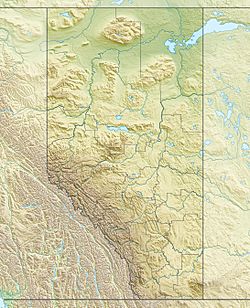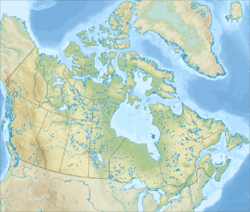Brachiopod Mountain facts for kids
Quick facts for kids Brachiopod Mountain |
|
|---|---|
| Highest point | |
| Elevation | 2,667 m (8,750 ft) |
| Prominence | 152 m (499 ft) |
| Listing | Mountains of Alberta |
| Geography | |
| Location | Banff National Park Alberta, Canada |
| Parent range | Canadian Rockies Slate Range |
| Topo map | NTS 82N/08 |
| Climbing | |
| First ascent | 1911 J.F. Porter and party |
| Easiest route | Scrambling Routes west slopes |
Brachiopod Mountain is a cool peak located in the Canadian Rockies. It's part of the Slate Range in Banff National Park, Alberta, Canada. This mountain got its name from James F. Porter, who explored it in 1911. He found lots of fossils of ancient sea creatures called brachiopods in the rocks there.
Contents
What is Brachiopod Mountain?
Brachiopod Mountain stands tall at 2,667 meters (about 8,750 feet) above sea level. It's a significant peak in the Canadian Rockies, a huge mountain range. The mountain is known for its unique rocks. These rocks contain fossils from a very long time ago.
Why the Name "Brachiopod"?
The name "Brachiopod Mountain" comes from tiny sea animals. These animals are called brachiopods. They lived in the ocean millions of years ago. Their shells became fossils in the mountain's limestone rocks. Finding these fossils helps scientists learn about Earth's past.
Where is Brachiopod Mountain Located?
This mountain is found in Banff National Park. This park is a famous natural area in Alberta, Canada. Brachiopod Mountain is part of a smaller group of mountains called the Slate Range. It's a beautiful spot for nature lovers and hikers.
Weather and Climate at Brachiopod Mountain
The weather at Brachiopod Mountain can be very cold. It has a subarctic climate. This means winters are long and snowy. Summers are usually mild and short.
What is a Subarctic Climate?
A subarctic climate is a type of weather found in northern regions. It has very cold winters. Temperatures can drop below −20 °C (which is -4 °F). With wind, it can feel even colder, sometimes below −30 °C (-22 °F). Summers are cool and short. This climate creates a unique environment for plants and animals.
When is the Best Time to Visit?
Most people visit Brachiopod Mountain in the warmer months. This is usually from June to September. During this time, the snow has melted. The trails are more accessible for hiking and exploring. Always check the weather forecast before you go. Mountain weather can change very quickly.
 | Kyle Baker |
 | Joseph Yoakum |
 | Laura Wheeler Waring |
 | Henry Ossawa Tanner |



